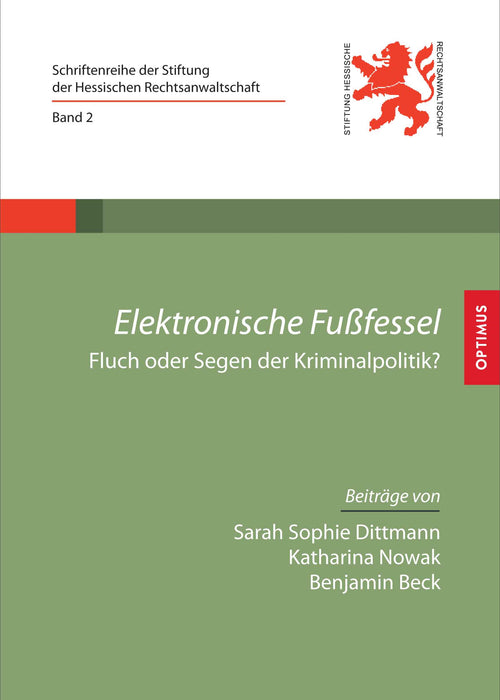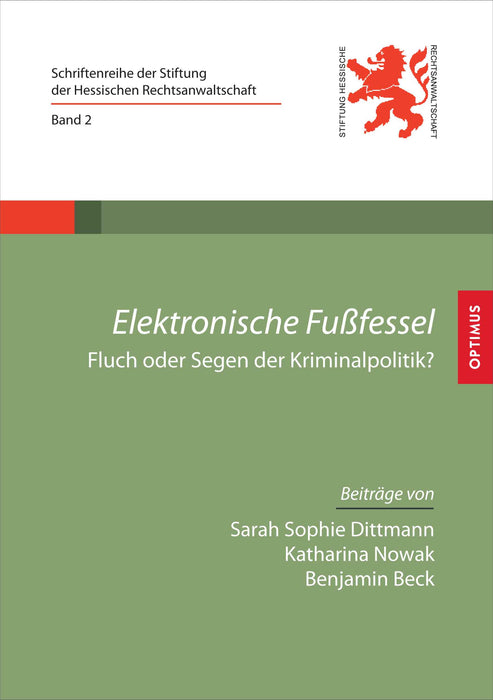In view of the broad discussion and in the light of the Hessian project, the Foundation of the Hessian Lawyers' Association announced a student essay competition and awarded the "Prize of the Foundation of the Hessian Lawyers' Association". The participants were called upon to critically examine and constructively pursue one or more fundamental questions triggered by the electronic tag. The contributions received were judged by a jury consisting of lawyer Thomas Scherzberg, chairman of the Hessian criminal defense association and the head of the criminal law department in the Hessian Ministry of Justice, for Integration and Europe, Dr. Helmut Fünfsinn, lecturer at the Johann Wolfang Goethe University, appraised. The Foundation of the Hessian Lawyers' Association is pleased to present the contributions of the three award winners Sarah Sophie Dittmann, Benjamin Beck to the willing reader and Katharina Nowak , who awarded her the prize at the suggestion of the jury.
Authors
Sarah Sophie Dittmann, born in Hamburg in 1984, graduated from the Blankenese Gymnasium, studied law from 2003 to 2011 at the Johann Wolfgang Goethe University in Frankfurt and received her second degree from the Université Lumière Lyon in 2006/2007 obtained the diploma des études juridiques françaises.
Katharina Nowak was born in 1982 in Erfurt. After graduating from high school, she trained as a publishing clerk and then worked at Druck- und Verlagshaus Frankfurt am Main GmbH. She has been studying law at the Goethe University in Frankfurt am Main since October 2008.
Benjamin Beck, born in Hadamar in 1987, has been studying law at the Goethe University in Frankfurt am Main since 2007, specializing in "Law and Finance". Since February 2009 he has been at the "Institute for Monetary and Financial Stability" at the chair of Prof. Dr. dr h.c. Helmut Siekmann works as a student assistant. He also took part in the "Willem C. Vis International Commercial Arbitration Moot" for Goethe University in 2009/10 and received the "Frédéric Eisemann Award - Prevailing Team in Oral" with his team.
Details
- Title: Electronic Anklet
- Subtitle: Curse or blessing of criminal policy?
- Author: Benjamin Beck, Katharina Nowak, Sarah Sophie Dittmann
- Series: Series of publications by the Hessian Bar Association
- Edition: 1st edition
- Band: 2
- Publisher: Foundation of the Hessian Lawyers' Association
- Reviewer: Dr. Helmut Fünfsinn, Thomas Scherzberg
- Published: 1st edition 05/20/2011
- Subject: Law
- Product Type: Book (Hardcover)
- Type of product: Collection
- Language: German
- Binding: Softcover (paperback)
- Dimensions: 21.0 x 14.8 cm (DIN A5)
- Scope: 108 pages
- Condition: New (wrapped in foil)
- Keywords: electronic tag, electronic surveillance, alternatives to detention, house arrest, juvenile detention, criminal policy, human dignity, modern penal system, net-widening, preventive detention, surveillance
Table of contents
Contribution by Sarah Sophie Dittmann
I. Foreword
II. The creation of a legal basis for the use of the electronic tag in the Hessian juvenile prison
A. The judgment of the Federal Constitutional Court
B. The implementation of the judgment at the Hessian level
1. The goal of the Hessian juvenile detention system
2. The internal design of the enforcement objective: the duty to cooperate
3. The concept of education as a special expression of the concept of resocialization in juvenile detention
4.The field of application of the electronic tag in the context of preparing for release from the juvenile prison
C Prerequisites for the use of the electronic tag
D. Technical implementation of electronic surveillance
III. The electronic ankle bracelet as an instrument of educational enforcement
A. Electronic surveillance with regard to the general criminal purposes of juvenile criminal law
B. The use of shackles as a form of modern penal system
C. Constitutional issues
1. The inviolability of the home, Art. GG
2. Telecommunications secrecy, Art. GG
3. Freedom of movement, Art. GG
4. Personal freedom, Art. 2 II S. 2 GG
5. The right to informational self-determination, Article 2 I in conjunction with Article 1 I GG
6. Human dignity, Art. 1 I GG
7. The general principle of equality, Art. 3 I GG
D. The Problem of Net Widening as an Obstacle to Achieving Goals
E. Advantages of using the electronic ankle tag
F. Disadvantages of using the electronic tag
IV. Conclusion
V. Bibliography
Contribution by Katharina Nowak
I. Introduction
II. Need for alternatives to detention
III. Requirements for participation in Electronic Monitoring
IV. Does electronic ankle tag monitoring make sense for alcohol or drug addicts?
V. Possibility of determining alcohol and drug consumption within the framework of electronically monitored house arrest
VI. Other Applications
VII. Net Widening Effects
VIII. Other advantages and disadvantages of the electronic ankle tag
IX. Conclusion
X. Bibliography
Contribution by Benjamin Beck
I. Introduction
II. Application and legal framework in Germany
III. Electronic surveillance within the framework of preventive detention
A. Protection of the community
B. Reintegration of the person concerned
C. Result
IV. Electronic alcohol and drug abuse monitoring
A. Need for continuous monitoring
B. Possibilities of monitoring
1. Continuous transdermal alcohol monitoring
2. Breath alcohol controlled immobilizers (alcohol interlocks)
3. Breathalyser Facility
C. Result
V. Bibliography



